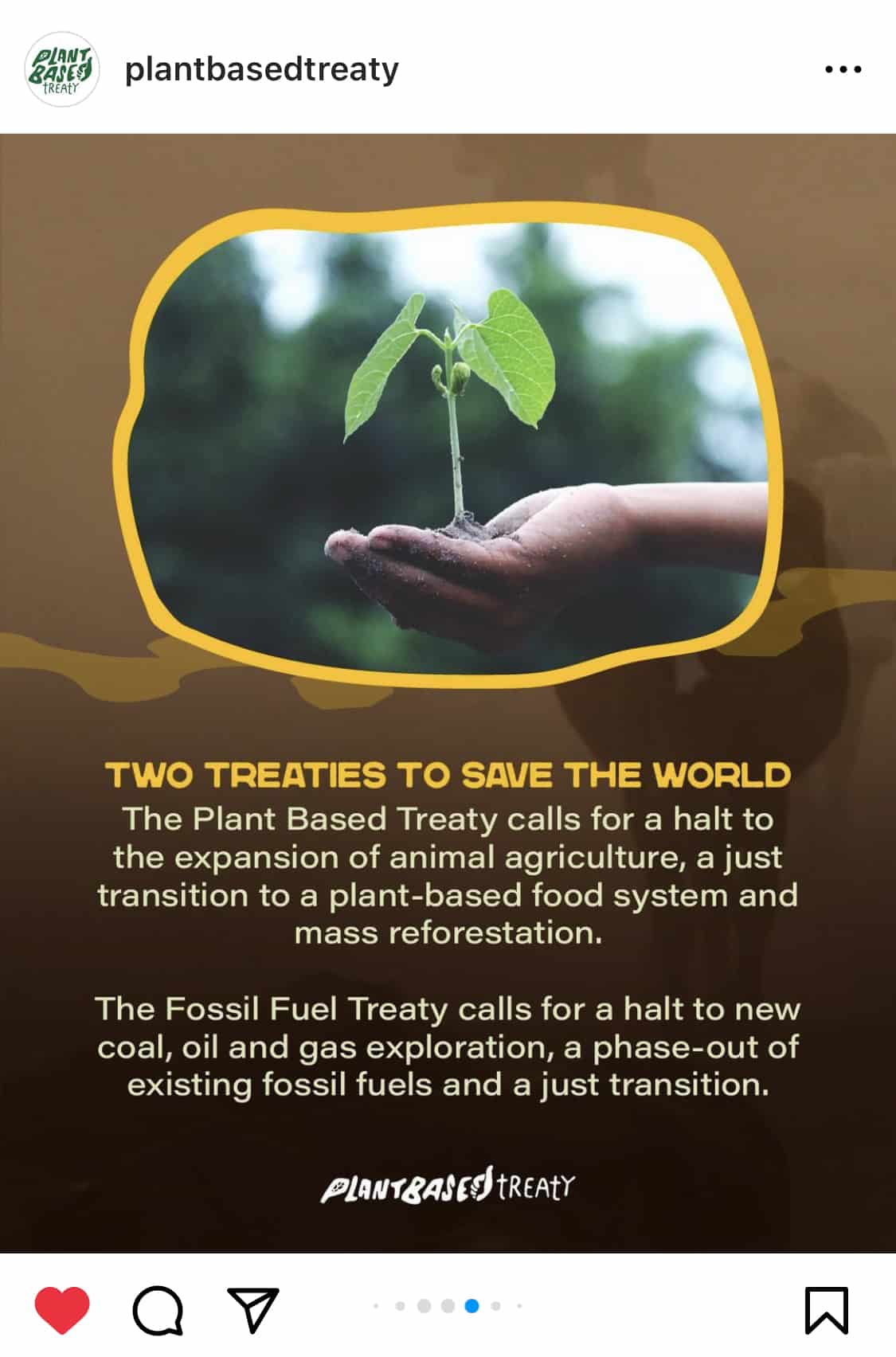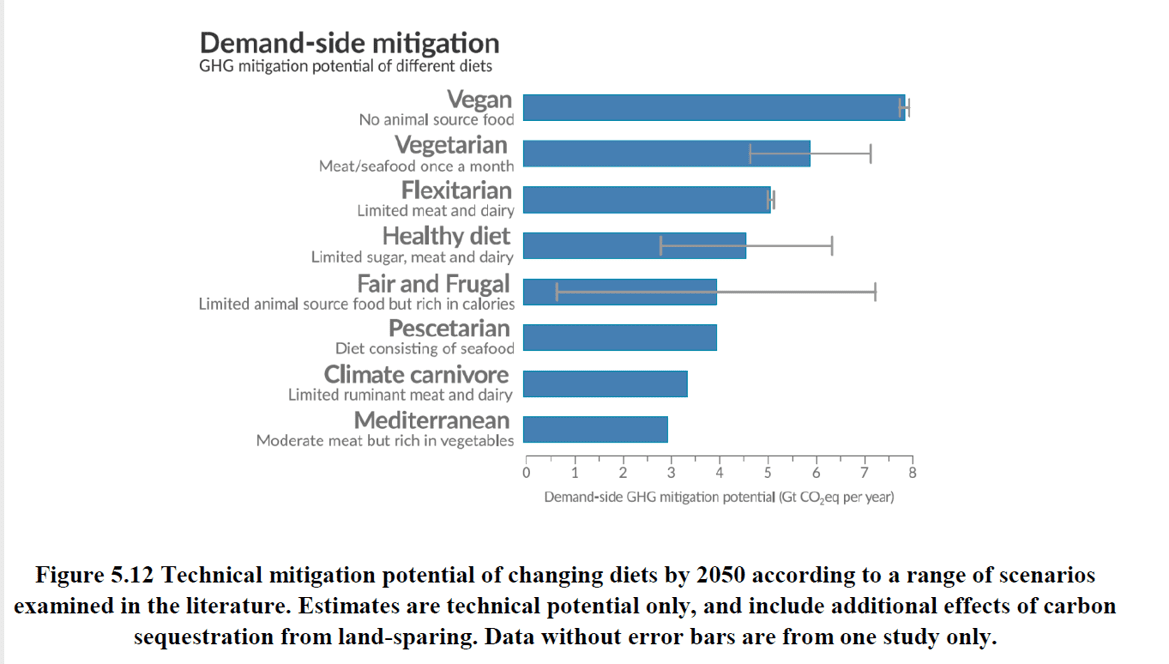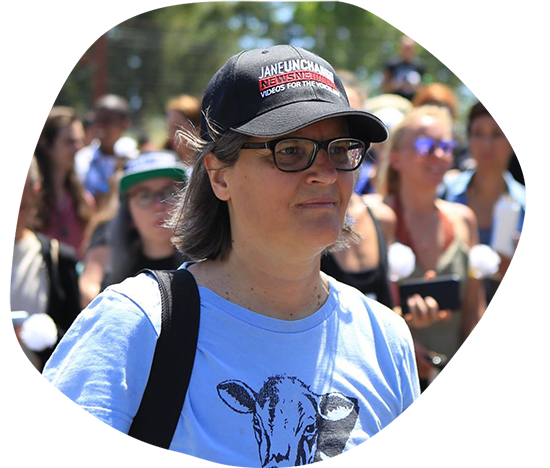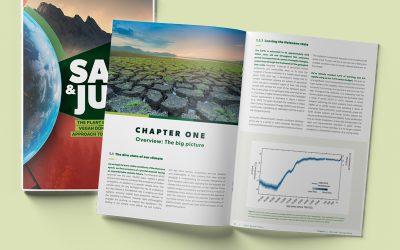Blog
On November 8, 2022, Tuvalu became the first country to use the UN climate negotiations to demand a Fossil Fuel Non-Proliferation Treaty.
During his formal address at the UN Climate Talks in Sharm El-Sheikh, Prime Minister Kausea Natano took the main plenary stage and stated:
“We all know that the leading cause of the climate crisis is fossil fuels. Tuvalu has joined Vanuatu and other nations in calling for a Fossil Fuel Non-Proliferation Treaty to steer our development model to pursue renewables and a just transition away from fossil fuels.”
Since its inception, the Plant Based Treaty has been following and celebrating the progress of what we consider our sister treaty. Recently, the Fossil Fuel Non-Proliferation Treaty has been endorsed by a series of cities, countries and institutions, including the World Health Organization, the Vatican, the European Parliament, London Mayor Sadiq Khan and now two countries: Tuvalu and its fellow Pacific nation, Vanuatu. They have all called for nation-states to negotiate a global treaty. Los Angeles became the first US city to endorse the Fossil Fuel Treaty in 2021. LA made history by endorsing the Plant Based Treaty on October 25, 2022, thereby recognizing the critical role cities play in creating bottom-up pressure for global agreements and leading by example in tackling the two largest sources of emissions: fossil fuels and food.
Meet Fossil Fuel Treaty’s little (annoying) sister
We need two treaties to save the world. With current policies leading us down a path beyond 2ºC warming, we need to reach two global agreements addressing food and energy and implement climate solutions now. We know the solutions, so it’s time to stop pouring fuel on the flames and roll out the rescue plan.
Just as the Fossil Fuel Treaty calls for a halt to new coal, oil and gas exploration, a phase-out of existing fossil fuels and a just transition; the Plant Based Treaty has 3Rs calling for a halt to the expansion of animal agriculture (Relinquish), a just transition to a plant-based food system (Redirecting subsidies, taxes and public information campaigns) and mass reforestation (Restore).
The Fossil Treaty, started in 2019 through a Climate Breakthrough award, has been endorsed by more than 100 Nobel Laureates, including the Dalai Lama, 352,000 individuals, 1,328 organizations and 70 cities and subnational governments.

After meeting with Tzeporah Berman, chair of the Fossil Fuel Treaty, on April 29, 2021, we replicated the Fossil Fuel Treaty’s bottom-up pressure model. The Plant Based Treaty similarly started collecting endorsements. So far, 62,000 individuals, more than 2,000 groups and businesses, 20 cities in five countries, 5 Nobel laureates, about 300 politicians and a slew of celebrities have added their endorsement.
Let’s correct the narrative: animal farming contributes 16.5% – 28%, not 14.5% of all greenhouse gas emissions
The Fossil Fuel Treaty’s press release issued on November 8, 2022, says:
“As Tuvalu faces the prospect of their islands disappearing, the Prime Minister’s speech comes with the backdrop of loss and damage being a central issue for the COP27 climate negotiations, one that experts expect to only escalate with every fraction of warming. Fossil fuels are the primary cause of this loss and damage, with coal, oil and gas fueling 86% of the CO2 emissions in the past decade.”
Their press release relies on old, debunked data on greenhouse gas contributions from animal agriculture. George Mobiot in The Guardian on November 9, 2022 writes:
“Livestock [sic animal] farming, a recent paper in the journal Sustainability estimates, accounts for between 16.5% and 28% of all greenhouse gas pollution. The wide range of these figures is an indication of how badly this issue has been neglected. As the same paper shows, the official figure (14.5%), published by the UN Food and Agriculture Organisation, is clearly wrong. Everyone in the field knows it, yet few attempts have been made to update it.”
The wide range of actual emissions from the food sector points to the need to carry out robust and current research on greenhouse gas emissions from animal farming and the loss of carbon sinks from land use change.
In reality, it is irrelevant what the exact percentages are because fossil fuels and animal farming both need to be addressed simultaneously and in equal measure to avoid catastrophic 2ºC planetary warming. Just as we need to leave fossil fuels in the ground, we need to leave animals off our plates. It’s imperative to phase out both fossil fuels and animal farming this decade. We don’t need to separate the issues and the environmental and plant-based movements; rather, we need to work together on climate solutions if we are to live within our planetary boundaries.
All the greenhouse gasses are accelerating, including methane. Animal agriculture is responsible for 32% of human-caused methane emissions. George Monbiot continues in the Guardian article, “A paper in Climate Policy estimates that, by 2030, greenhouse gases from livestock [sic animal] farming could use half the world’s entire carbon budget, if we want to avoid more than 1.5ºC of global heating.”

Source: 2019, IPCC Special Report on Climate Change and Land
A vegan diet is the optimal diet to fight climate change
According to the IPCC Special Report on Climate Change and Land (2019), shifting to a plant-based diet can save up to 8 billion tonnes of CO2 equivalent annually, not counting land use benefits such as rewilding land and restoring planet-saving carbon sinks. Other diets like climate carnivore (eating limited cow, goat and sheep flesh and dairy) result in only 3.5 GT savings and moreover contribute to destructive land use changes.
“If we changed to a plant-based diet, we could feed ourselves using 76% less land. And if that is not enough you could do it for health reasons. Or moral ones. We currently kill more than 70 billion animals every year, excluding fish, whose numbers are so great that we measure their lives only by weight.” – The Climate Book, Greta Thunberg

Anita Krajnc is the co-founder of Toronto Pig Save and the Executive Director of the Animal Save Movement, a worldwide network of Save groups bearing witness to farmed animals and promoting veganism and love-based, grassroots activism. Anita helps coordinate global campaigns such as the Plant Based Treaty.

Nicola Harris has over 20 years experience in pressure campaigning in the UK and is a director of communications. She studied Psychology and Computing at Bournemouth University where she learned how to apply our knowledge of human memory and information processing for application in communication, copy writing and media strategies.
More from the blog
6 More Important Calls To Action From The Safe And Just Report – Part Two
By Miriam Porter
6 Important Calls To Action From The Safe And Just Report – Part One
By Miriam Porter
Grow Your Own Kale And Spinach For Healthy Green Smoothies
By Miriam Porter




